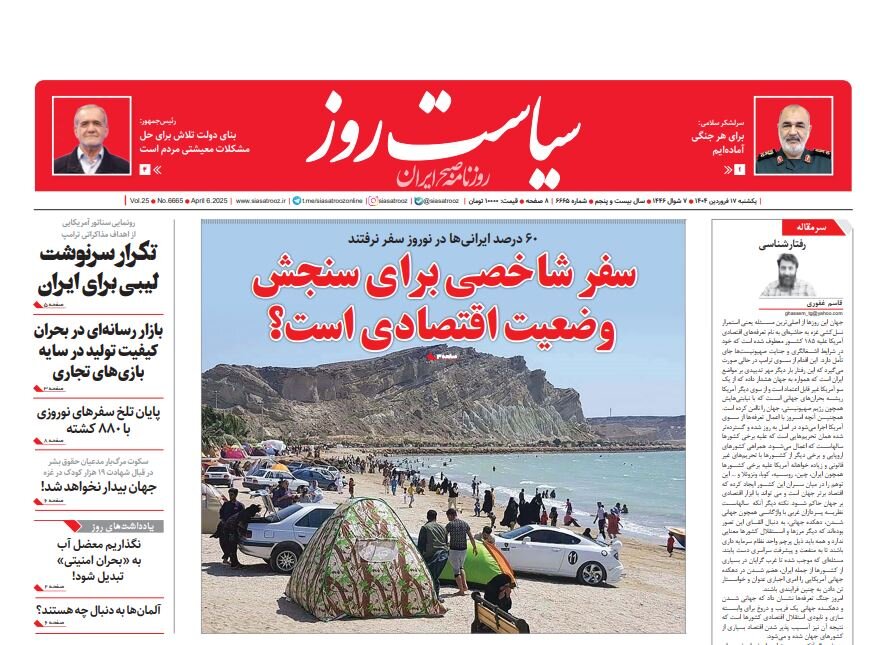Tehran-Siasat-e-Rooz has editorialized American actions both in Iran and around the world.
It writes: Americans’ actions show that they are not complying with international commitments or regulations and simply violating them. So discussions such as direct negotiations with the US, agreements with Trump, or participation in agencies like the FATF not only fail to resolve the issue, but also lead to increased sanctions and pressure. On the one hand, the US Treasury Department says it is trying to shut down all bank and financial transactions with Iran, while on the other hand, the US says its goal of negotiations with Iran is to end all the country’s nuclear activities and turn them into Libya, destroying missile and drones’ capabilities and the location of its region. Today, the world has no other option to escape the current situation and confront America’s economic “selfishness.” The only way forward is to dismantle and end cooperation with US sanctions on other countries, and ultimately strengthen new blocks such as BRICS.
Sharg: Grossi’s trip to Tehran and the equation between Iran and the IAEA
Sharg wrote in Tehran an analysis of Rafael Grossi’s in and out of the International Atomic Energy Agency Director. In these circumstances, Rafael Grossi’s impending trip to Tehran again highlighted the tense relationship between Iran and the IAEA. This trip can be explored from two different analytical perspectives. The resolution of the differences with the IAEA and the possibility of Trump’s looming shadows and conflicts. Tehran is in a complicated situation. On the one hand, they want to maintain a path to interaction with the IAEA, while on the other hand, they are concerned that this path will serve as a platform for legalizing new pressures. In short, Grossi’s trip to Tehran could provide an opportunity to repair Iran’s relationship with IAEA and Europe, but the highly inflamed political atmosphere caused by Trump’s return to power severely limits the possibility of actively using this trip. This is where technological interactions without active, intelligent diplomacy can add to existing complexity rather than untie the knot.
sobh-e-no: Trump will retreat when he enters war with Iran
In the memo, Sobh-e-no argues that if US Donald Trump joins the war with Iran, he will put his country for many years. The paper said: Today, Iran is not considered a threat to the US national interests. However, the Islamic Republic is at the top of Washington’s foreign policy priorities, spending heavily on the military to stand up to Tehran. The US’s goal is to prevent Iran from becoming a nuke in the future. As Iran is seen as a model for fighting arrogance and American hegemony, its approach can be replicated all over the world, making America more disliked by the world’s eyes. If there is rationality among American politicians, they will tame Trump. Trump is trying to maintain American hegemony in the world, and if he enters an adventurous war with Iran, he will bring his country back from rivals for years.
Arman-e-Emrooz: Possible talks on Iran’s economy will affect
In a recent commentary, Arman-E-Emrooz discussed the potential impact of continuing negotiations on Iran’s economy. The country faces major challenges due to recent international sanctions and fluctuations in exchange rates. Advances in nuclear negotiations could have a significant positive effect on Iran’s economy by reducing sanctions, promoting oil exports, strengthening international banking and financial ties, attracting foreign investment, suppressing inflation, and ultimately improving citizens’ livelihoods. The nuclear conflict between Iran and the US remains an important issue affecting the Iranian economy. The historical experience of the Joint Comprehensive Plan of Action (JCPOA) shows that even the mere initiation of negotiations, whether directly or indirect, can produce positive psychological effects on the market and pave the way for greater economic stability. Conversely, if a deal is reached or a transition to military conflict is not reached, it will have disastrous consequences for Iran’s economy. Given the importance of this issue, the Iranian government is expected to seize diplomatic opportunities in the early months of this year to ease economic pressure through a strategic approach. The outcome of these diplomatic efforts will undoubtedly shape the economic trajectory of Iran this year.

